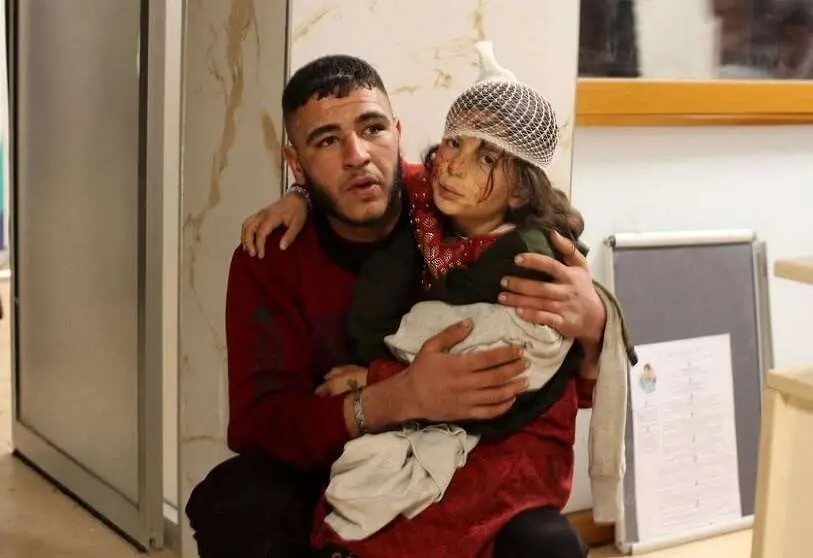Turkey and Syria: in the midst of tragedy after powerful earthquake

A large part of the Turkish-Syrian border remains in destruction, chaos and drama after the powerful earthquake measuring 7.8 on the Richter scale struck early Monday morning. Turkish and Syrian authorities are already reporting at least 2,600 dead and around 13,000 injured, 10,000 of whom are on Turkish territory.
Due to the major earthquake and its aftershocks, some of which exceeded 6.0 on the Richter scale, up to 2,000 buildings in the area have collapsed, leaving a terrifying number of people dead, injured and missing. The main quake struck in a swathe between the Syrian cities of Aleppo and Hama and the Turkish enclave of Diyarbakir, more than 330 kilometres northeast of Syria, as confirmed by Fuat Oktay, Turkey's vice-president, causing widespread devastation.
Atalayar spoke to Hakan Bilgin, president of Doctors of the World in Turkey, who is familiar with the situation in the Turkish cities of Adana and Antakya, to discuss the situation, the measures being implemented at the beginning of the tragedy and how he can help the situation to be repaired as soon as possible. Hakan Bilgin himself speaks of more than a year before some semblance of normality can be restored.

Hakan, how is the situation on the ground?
The situation is very bad. The whole city of Adana and Antakya are affected, people are on the streets, many want to leave to go to other cities and look for relatives. It's very difficult. We have our Doctors of the World teams there and they were affected too, we are reorganising to help in Turkey and Syria.
I am between Adana and Antakya in Turkey. Adana was badly affected despite being an hour and a half from the epicentre of the earthquake.
What work are you doing at the moment?
The first thing is to see how the equipment we have is doing, what has happened and then we have launched the alert that we have with kits to send in case of major emergencies, such as this one. We are coordinating with the Doctors of the World network to put everything together and send everything possible to the affected areas, in terms of material, donations, professional medical staff and other sectors to support the population.

How many people have been killed or injured in the last few hours?
There is talk of more than 2,000 dead and more than 2,000 buildings destroyed; but the investigations continue, there are more buildings that continue to fall and there will surely be more victims. This makes things more difficult for us because we have teams trying to get survivors out of collapsed buildings and it is difficult to do that with aftershocks of 7.4, 6.5, 6.
What kind of international aid is coming in? Countries like Germany, Spain, Russia and even the European Union among others have announced aid.
International solidarity, above all. There is a response so far which is very good. There is a willingness to help Turkey and Syria internationally. The Turkish government is mobilising and making efforts to facilitate the arrival of this aid so that people can enjoy material and aid. So far, good aid is coming in. That is something to be appreciated.

Do you know more about the Turkish side or the Syrian side? When it comes to assessing what is happening on both sides of the border.
I have opened clinics in Syria, I have been going there regularly for ten years. We were there three days ago and we have just returned. Yes, we have an idea of how things are in Syria as well. We have to talk about how the situation is also in the Syrian country, with the aggravated problem of the civil war making things more difficult.

Turkey is a country that has suffered other major earthquakes in the past.
We are used to it. There was the Izmir earthquake recently, but not on the same scale as this one. It was easier to get help through more quickly. Here, entire roads have collapsed, airports have been affected, etc. Everything makes things more difficult. There is an infrastructure prepared for earthquakes, but this magnitude of earthquake now makes everything more complicated. Although I hope that in the coming days everything can be adjusted with international aid; and with more resources from the Turkish state as well. The first week will be decisive.
Surely, given the magnitude of what has happened, normality will not be restored for more than a year. Now we must hope that we do not have more earthquakes like this one in a row. That there are no repeats, or that they are mild enough to facilitate the relief work.
Tras el #terremoto de 7,8 grados en Turquía y Siria, nos movilizamos hacia las zonas más dañadas.
— Médicos del Mundo (@MedicosdelMundo) February 6, 2023
Las necesidades en Siria ya eran abrumadoras por un conflicto de más de una década... Este seísmo no va sino a agravarlas.
Lee más? https://t.co/kQiH3gvdON
? @dunyadoktorlari pic.twitter.com/us7PLGnObw
Are there forecasts of more aftershocks?
Yes, we have had aftershocks of 7.4 on the Richter scale, 6.5, 6 and we are still having them.
Hakan, all our support from Spain. What appeal can we make to our readers to see how they can help?
They can collaborate with Doctors of the World in Spain, Doctors of the World in Turkey, we have a website where they can make donations... But, please, it is important to talk about Syria because they are suffering a lot of needs. We must not forget the Syrian problem and the refugees affected by the civil war.







